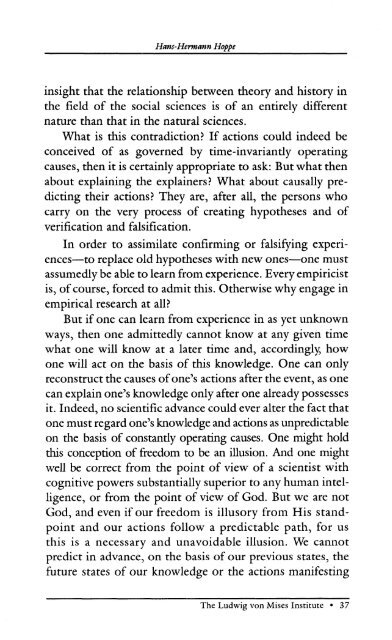Economic Science and the Austrian Method_3
Economic Science and the Austrian Method_3
Economic Science and the Austrian Method_3
- No tags were found...
Create successful ePaper yourself
Turn your PDF publications into a flip-book with our unique Google optimized e-Paper software.
Hans-Hermann Hoppeinsight that <strong>the</strong> relationship between <strong>the</strong>ory <strong>and</strong> history in<strong>the</strong> field of <strong>the</strong> social sciences is of an entirely differentnature than that in <strong>the</strong> natural sciences.What is this contradiction? If actions could indeed beconceived of as governed by time-invariantly operatingcauses, <strong>the</strong>n it is certainly appropriate to ask: But what <strong>the</strong>nabout explaining <strong>the</strong> explainers? What about causally predicting<strong>the</strong>ir actions? They are, after all, <strong>the</strong> persons whocarryon <strong>the</strong> very process of creating hypo<strong>the</strong>ses <strong>and</strong> ofverification <strong>and</strong> falsification.In order to assimilate confirming or falsifying experiences-toreplace old hypo<strong>the</strong>ses with new ones-one mustassumedly be able to learn from experience. Every empiricistis, ofcourse, forced to admit this. O<strong>the</strong>rwise why engage inempirical research at all?But if one can learn from experience in as yet unknownways, <strong>the</strong>n one admittedly cannot know at any given timewhat one will know at a later time <strong>and</strong>, accordingl~ howone will act on <strong>the</strong> basis of this knowledge. One can onlyreconstruct <strong>the</strong> causes ofone's actions after <strong>the</strong> event, as onecan explain one's knowledge only after one already possessesit. Indeed, no scientific advance could ever alter <strong>the</strong> fact thatone must regard one's knowledge <strong>and</strong> actions as unpredictableon <strong>the</strong> basis of constantly operating causes. One might holdthis conception of freedom to be an illusion. And one mightwell be correct from <strong>the</strong> point of view of a scientist withcognitive powers substantially superior to any human intelligence,or from <strong>the</strong> point of view of God. But we are notGod, <strong>and</strong> even if our freedom is illusory from His st<strong>and</strong>point<strong>and</strong> our actions follow a predictable path, for usthis is a necessary <strong>and</strong> unavoidable illusion. We cannotpredict in advance, on <strong>the</strong> basis of our previous states, <strong>the</strong>future states of our knowledge or <strong>the</strong> actions manifestingThe Ludwig von Mises Institute • 37


